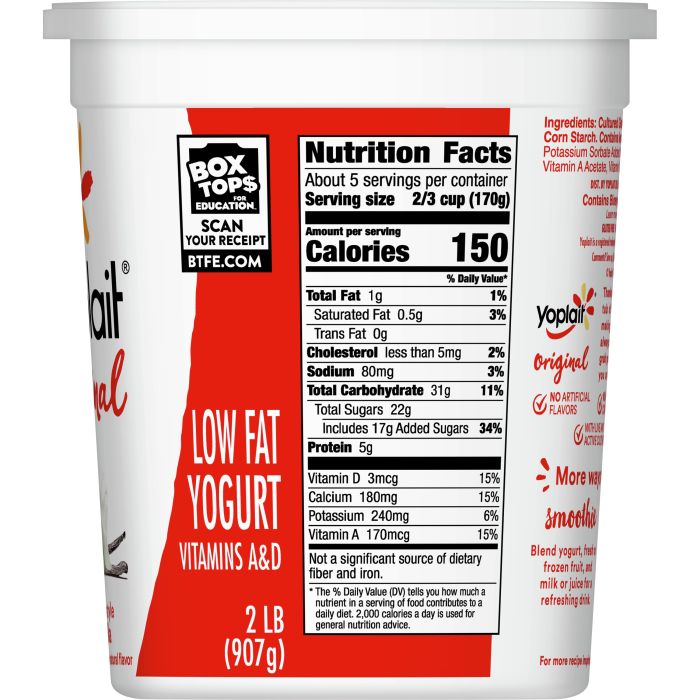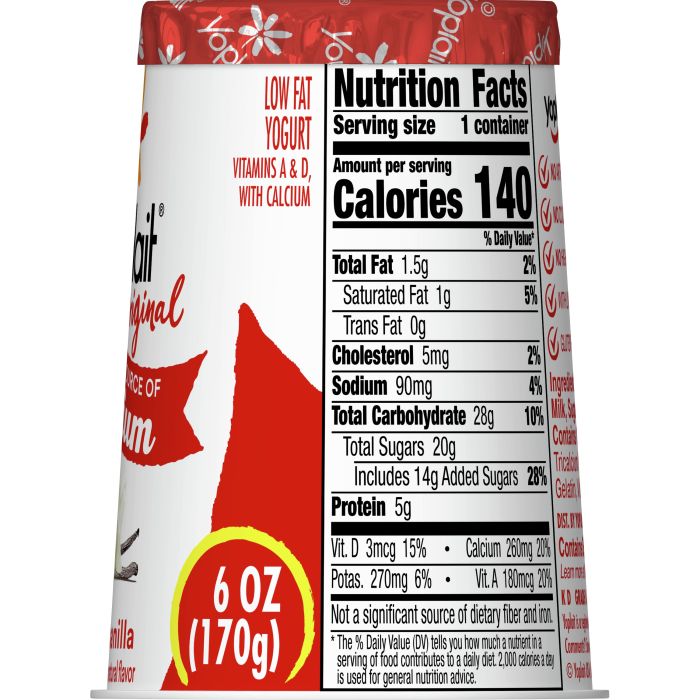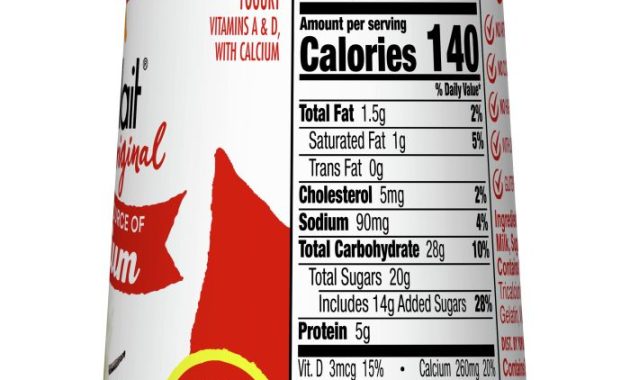Nutritional Composition of Vanilla Yogurt

Nutrition facts for vanilla yogurt – Vanilla yogurt, a popular snack and breakfast staple, offers a blend of nutrients beneficial for health and well-being. Its nutritional profile varies depending on factors like brand, fat content (full-fat, low-fat, non-fat), and added ingredients such as fruit or sweeteners. Understanding this composition is key to making informed choices about its inclusion in a balanced diet.
Macronutrient Breakdown in Vanilla Yogurt
The macronutrient content of vanilla yogurt primarily consists of protein, carbohydrates, and fats. The proportions of each vary considerably depending on the type of yogurt. Plain, non-fat yogurt will have a different profile than a full-fat yogurt with added fruit and sugar. Generally, a typical serving (around 170g) of plain vanilla yogurt provides a range of:* Protein: 8-15 grams.
So, you’re checking the nutrition facts for vanilla yogurt, huh? Maybe you’re comparing it to something a little… more substantial? Like, for instance, if you’re looking for a protein boost, you might want to check out the nugo protein bars nutrition facts – then you can get back to deciding whether that yogurt is worth the sugar rush! But seriously, always read the fine print; even yogurt can pack a surprise.
Protein is crucial for building and repairing tissues, supporting immune function, and contributing to satiety. Higher protein yogurts are often beneficial for muscle growth and maintenance.* Carbohydrates: 15-25 grams. These carbohydrates primarily come from lactose (milk sugar). The carbohydrate content significantly increases with the addition of fruit or sweeteners.* Fat: 0-8 grams. Fat content depends heavily on the milk fat percentage.
Full-fat yogurt contains more fat, contributing to a richer flavor and creamier texture. Low-fat and non-fat options offer reduced fat content.
Micronutrient Content and Health Benefits
Beyond macronutrients, vanilla yogurt offers several essential micronutrients that contribute to overall health. These include:* Calcium: Yogurt is an excellent source of calcium, crucial for strong bones and teeth. This is particularly important for growing children and adults aiming to prevent osteoporosis.* Potassium: A significant amount of potassium helps regulate blood pressure and fluid balance in the body.* Riboflavin (Vitamin B2): Contributes to energy production and healthy skin.* Vitamin B12: Essential for nerve function and red blood cell formation, particularly important for vegetarians and vegans.
Nutritional Comparison: Plain vs. Flavored Yogurt, Nutrition facts for vanilla yogurt
The following table provides a comparative overview of the nutritional information for a standard serving (approximately 170g) of plain vanilla yogurt and a serving of vanilla yogurt with added fruit and sweeteners. Note that these values are estimates and can vary depending on the specific brand and ingredients.
| Nutrient | Plain Vanilla Yogurt (approx.) | Vanilla Yogurt with Added Fruit/Sweeteners (approx.) |
|---|---|---|
| Calories | 100-150 | 150-250 |
| Protein (g) | 10-12 | 8-10 |
| Carbohydrates (g) | 18-22 | 25-35 |
| Fat (g) | 0-5 | 1-7 |
| Sugar (g) | 5-10 | 15-25 |
| Calcium (mg) | 200-300 | 150-250 |
Impact of Added Ingredients on Nutritional Value
Yo, Makassar! Let’s get real about vanilla yogurt. We all know the creamy goodness, but adding stuff changes the game, especially when it comes to your health. This ain’t just about taste; it’s about the nutritional punch you’re getting (or not getting). We’re breaking down how different additions impact the nutritional value of your favorite yogurt.Plain vanilla yogurt is usually your best bet for a solid nutritional base.
But once you start adding sugar, fruits, or other flavorings, things get a little more complex. The changes aren’t always bad, but understanding them is key to making informed choices.
Effects of Different Sweeteners on Nutritional Value and Glycemic Index
Different sweeteners significantly alter a yogurt’s nutritional profile and its impact on blood sugar levels. Sugar, for instance, provides quick energy but contributes to empty calories and can spike blood sugar rapidly. Honey, while natural, still contains significant sugar and can affect blood sugar, though potentially less drastically than refined sugar. Artificial sweeteners, on the other hand, are calorie-free but their long-term health effects are still under research, and some people find them unpleasant to taste.
The glycemic index (GI), a measure of how quickly a food raises blood sugar, is substantially influenced by the type and amount of sweetener used. A yogurt with added sugar will have a higher GI than a plain yogurt.
Influence of Added Ingredients on Macronutrient Content
Adding ingredients directly affects the protein, fat, and carbohydrate content of your yogurt. Let’s illustrate this with some examples:
- Added Sugar: Increases carbohydrate content significantly, boosts calorie count without adding essential nutrients. For example, a 100g serving of plain yogurt might have 5g of sugar naturally, but adding 10g of sugar increases the total to 15g, impacting the overall nutritional balance.
- Fruit Puree: Adds natural sugars and vitamins but also increases the carbohydrate content. A 100g serving of yogurt with strawberry puree will have more carbohydrates than plain yogurt, but it also offers antioxidants and fiber from the strawberries.
- Chocolate Flavoring: Often contains added sugar and fat, leading to a higher calorie count and increased fat and carbohydrate content. It might also contain cocoa, which offers some antioxidants, but the overall effect is usually an increase in sugar and fat.
- Granola Topping: Significantly increases the fat and carbohydrate content, and often adds additional sugar. The added fiber can be a plus, but it’s important to watch the overall calorie and sugar intake.
Potential Health Benefits and Considerations

Vanilla yogurt, especially when chosen wisely, can be a tasty and nutritious addition to your daily diet. It offers a range of potential health benefits, but it’s crucial to be aware of potential drawbacks to make informed choices. Understanding the nutritional profile and its impact on your body is key to maximizing the positive effects and minimizing any negative ones.
This section explores both the upsides and downsides of incorporating vanilla yogurt into your eating habits.
Gut Health Benefits of Vanilla Yogurt
Yogurt, particularly those containing live and active cultures like
- Lactobacillus* and
- Bifidobacterium*, can significantly improve gut health. These beneficial bacteria aid digestion, support the immune system by competing with harmful bacteria, and contribute to a balanced gut microbiome. A healthy gut microbiome is linked to improved overall well-being, reduced inflammation, and better nutrient absorption. Studies have shown that regular consumption of yogurt with live cultures can alleviate symptoms of irritable bowel syndrome (IBS) and improve bowel regularity.
The amount of live cultures varies between brands and types of yogurt, so check the label for confirmation.
Impact of Yogurt on Bone Health
Vanilla yogurt, especially varieties fortified with calcium and vitamin D, can contribute positively to bone health. Calcium is the essential building block of bones, while vitamin D aids in calcium absorption. Strong bones are crucial for preventing osteoporosis and fractures, particularly as we age. Fortified yogurts offer a convenient way to increase your intake of these vital nutrients, especially if you don’t consume enough dairy or other calcium-rich foods.
However, it’s important to remember that yogurt alone won’t guarantee optimal bone health; a balanced diet rich in various nutrients and regular exercise are also essential.
Satiety and Vanilla Yogurt Consumption
Yogurt, due to its protein and fat content (depending on the type), can promote feelings of fullness and satiety. This can be beneficial for weight management by reducing overall calorie intake throughout the day. Protein is particularly effective at suppressing appetite, making you feel fuller for longer. Full-fat yogurt, in particular, tends to be more satiating than low-fat or non-fat varieties because of its higher fat content.
However, it’s important to be mindful of added sugars, which can negate the satiety benefits and contribute to weight gain.
Lactose Intolerance and Yogurt Consumption
Lactose intolerance, the inability to digest lactose (a sugar in milk), is a common concern for many people. While yogurt contains lactose, the fermentation process used to make yogurt partially breaks down lactose, making it potentially more digestible than milk for some individuals. However, the tolerance level varies widely, and some people with lactose intolerance may still experience symptoms after consuming yogurt.
Yogurt made with lactose-free milk is available for those with severe lactose intolerance.
Impact of Different Fat Contents on Health
The fat content in yogurt—full-fat, low-fat, or non-fat—significantly impacts its nutritional profile and potential health effects. Full-fat yogurt provides more calories and saturated fat, but also contains more fat-soluble vitamins and can lead to greater satiety. Low-fat and non-fat yogurts are lower in calories and saturated fat, but may lack some of the satiety benefits and certain nutrients found in full-fat varieties.
The best choice depends on individual dietary needs and preferences, considering factors like overall calorie intake, cholesterol levels, and personal health goals. For example, individuals aiming to reduce saturated fat intake might opt for low-fat or non-fat options, while those seeking increased satiety might choose full-fat. The key is moderation and balance within a broader healthy eating plan.
User Queries: Nutrition Facts For Vanilla Yogurt
Is vanilla yogurt a good source of protein?
Yes, especially Greek yogurt, which boasts a higher protein content than regular yogurt. The protein content varies depending on the brand and fat content.
Does vanilla yogurt contain probiotics?
Many vanilla yogurts contain live and active cultures (probiotics), which are beneficial for gut health. Check the label to confirm.
Is all vanilla yogurt created equal?
No, the nutritional content varies significantly based on the brand, type (Greek, regular), fat content, and added ingredients (sugar, fruit, etc.). Always read the nutrition label.
Can people with lactose intolerance eat vanilla yogurt?
Some individuals with lactose intolerance can tolerate yogurt better than milk due to the fermentation process. However, lactose-free options are available for those with severe intolerance.

